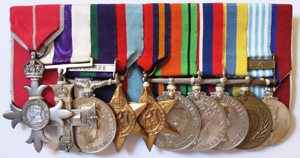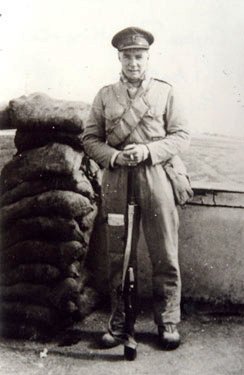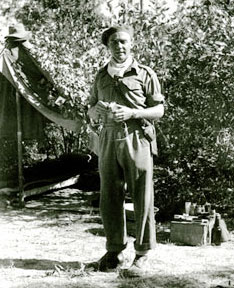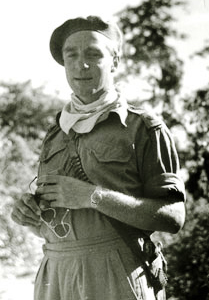Museum of the Manchester Regiment Object Focus
The Medals of Lieutenant - Colonel Robert ‘Rex’ King-Clark.
 Robert’s father was a stockbroker in London when the First World War broke out. He joined the army in 1914 at the age of 42. He died of wounds exactly two weeks before the end of the war leaving his wife, two daughters and two sons of whom Robert was the elder boy.
Robert’s father was a stockbroker in London when the First World War broke out. He joined the army in 1914 at the age of 42. He died of wounds exactly two weeks before the end of the war leaving his wife, two daughters and two sons of whom Robert was the elder boy.
After prep school in Sussex Rex went to Loretto, Edinburgh with his brother Cuffy. From Loretto ‘Rex’ went to Sandhurst where his nickname was coined by a fellow cadet, one by which he was known with great affection by all ranks, for the rest of his life.
To his considerable surprise he became a cadet sergeant and gained a Blue for Fencing, going on to win the Inter-Services Foil at the 1933 Royal Tournament. Like many Loretto boys (as opposed to those from English public schools) he did not find Sandhurst over arduous. As he was later heard to say, “I never even got beaten there”, a not uncommon occurrence at Loretto.
In February 1934 Rex was commissioned into the Manchester Regiment. This was through the influence of his sister’s father-in-law, Sir John Maclure, an ex-officer of the Manchester’s and who served on the Regimental Council. He joined 2nd Manchester’s at Strensall serving with them until 1937 when he joined the 1st Battalion in Egypt and on to Palestine and Singapore.
A part of his life as a soldier which he enjoyed most was his six months in 1938 when as a Lieutenant, he commanded one of Orde Wingate’s Special Night Squads against Arab Terrorists in the steep Galilean Hills of Northern Palestine. He was awarded the Military Cross and a certificate of Gallantry for this very special work. One Sergeant and ten other ranks from the Manchester Regiment were with him, together with a number of Jewish soldiers with whom he remained friends for many years. In 1958, he went to Israel as a guest of the Government and was presented with a medal for his, ”Heroic contribution to the People of Israel”.
In the ‘Thirties’ between the Wars, Rex was lucky enough to be able to indulge in a number of enterprising hobbies including motor racing at Brooklands and other tracks in Europe, Canada and the USA and especially in flying. His adventures in these fields are told with enthusiasm and excitement in his autobiography of the 1930s, Free For a Blast - the Clark slogan since 1646.
Flying became his main off-duty love and in the small black two-seat Cabin monoplane he owned from March 1937 to July 1939 he flew to 28 countries outside the UK – as far away as Bali in the East Indies. He revelled in his flying and was grateful to an Army which posted him to a variety of stations in a comparatively short time, and allowed him – even encouraged him – to ‘troop’ by private air.
 In 1937 Rex had applied for a four year secondment to the Royal Air Force and this was approved in March 1939. On arrival in England Rex went along to the War Office where he was told that he had never been heard of and that he was to return to his Battalion in Singapore after his leave was finished. Eventually this was sorted out and he was ‘attached to the 2nd Battalion of the Regiment, Aldershot, pending attachment to the RAF’.
In 1937 Rex had applied for a four year secondment to the Royal Air Force and this was approved in March 1939. On arrival in England Rex went along to the War Office where he was told that he had never been heard of and that he was to return to his Battalion in Singapore after his leave was finished. Eventually this was sorted out and he was ‘attached to the 2nd Battalion of the Regiment, Aldershot, pending attachment to the RAF’.
On 1st September 1939 his pending attachment was cancelled and he was to stay with 2nd Manchester’s for every day of the Second World War (1939-1945), getting command at the battle of Kohima, in Assam in 1944. Rex finally achieved his flying ambition and commanded the Glider Pilot Regiment in the UK between 1949 – 1952.
He then went to Korea where he served as Deputy Assistant Adjutant and Quartermaster General (DAA & QMG) of 28 British Commonwealth Brigade. Then a welcome return to The Manchester’s in 1953 in Berlin as Second in Command. His last military job was as General Staff Officer 1 (GSO1) Land/Air Warfare Directorate where he played a major part in the formation of the Army Air Corps. 
After retiring from the army in 1958 he joined Calor Gas Scotland as Regional Manager, where he remained until he finally retired in 1971.
In 1963 he and his family moved to Shandon where they lived happily for the next 44 years in their home overlooking the Gareloch with Rex raising and lowering the regimental flag on his flagpole in salute on all occasions when HM ships sailed by.
Rex always took great pride in flying the regimental flag when any member of the Regiment visited the family. In retirement Rex wrote five books: George Stuart Henderson VC (1975), Free For a Blast (1988), The Battle for Kohima 1944 (1995), Jack Churchill, Unlimited Boldness (1997) and Forward From Kohima (2003).
Rex died on 30th December 2007 aged 94.
This article was written by Captain Robert A. Bonner (Chairman of the Museum of the Manchester Regiment Advisory Committee). There are many artefacts in the Regimental Museum that were owned by Rex King-Clark.

